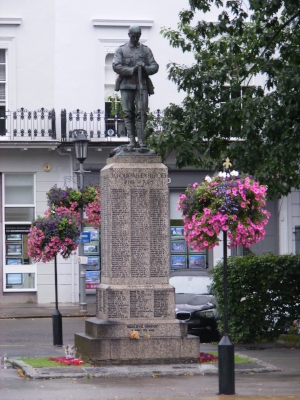The Sunday Section: Remembrance Sunday - War Poems
In honour of the fallen soldiers commemorated on Remembrance Sunday…
(Leamington Spa)
Commissioned into the Royal Naval Volunteer Reserve soon after his 27th birthday, Rupert Brooke sailed with the British Mediterranean Expeditionary Force in February 1915 to Gallipoli. En route, he developed sepsis from an infected mosquito bite and died on 23rd April 1915.
Rupert Brooke (taken by Sherrill Schell)
The Soldier
If I should die, think only this of me:
That there’s some corner of a foreign field
That is forever England. There shall be
In that rich earth a richer dust concealed;
A dust whom England bore, shaped, made aware,
Gave, once, her flowers to love, her ways to roam,
A body of England’s, breathing English air,
Washed by the rivers, blest by the suns of home.
And think, this heart, all evil shed away,
A pulse in the eternal mind, no less
Gives somewhere back the thoughts by England given;
Her sights and sounds; dreams happy as her day;
As laughter, learnt of friends; and gentleness,
In hearts at peace, under an English heaven.
Robert Laurence Binyon was too old to enlist; he was 45 when war was declared. His famous war poem, ‘For The Fallen’, was published in The Times in September 1914, barely 2 months after the start of the war. He volunteered at a British hospital for French soldiers, and later, in the summer of 1916, helped care for soldiers injured at Verdun.
Robert Binyon
For the Fallen
With proud thanksgiving, a mother for her children,
England mourns for her dead across the sea.
Flesh of her flesh they were, spirit of her spirit,
Fallen in the cause of the free.
Solemn the drums thrill: Death august and royal
Sings sorrow up into immortal spheres.
There is music in the midst of desolation
And a glory that shines upon our tears.
They went with songs to the battle, they were young,
Straight of limb, true of eye, steady and aglow.
They were staunch to the end against odds uncounted,
They fell with their faces to the foe.
They shall grow not old, as we that are left grow old:
Age shall not weary them, nor the years condemn.
At the going down of the sun and in the morning
We will remember them.
They mingle not with their laughing comrades again;
They sit no more at familiar tables of home;
They have no lot in our labour of the day-time;
They sleep beyond England’s foam.
But where our desires are and our hopes profound,
Felt as a well-spring that is hidden from sight,
To the innermost heart of their own land they are known
As the stars are known to the Night;
As the stars that shall be bright when we are dust,
Moving in marches upon the heavenly plain,
As the stars that are starry in the time of our darkness,
To the end, to the end, they remain.


